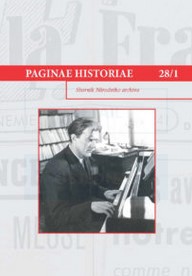KULTURNÍ POLITIKA SVAZU ČESKOSLOVENSKÝCH SKLADATELŮ V OBDOBÍ SOCIALISTICKÉHO REALISMU PERSPEKTIVOU VÁCLAVA DOBIÁŠE
A MUSIC POLICY OF THE SOCIALIST REALISM THROUGH THE PERSPECTIVE OF COMPOSER VÁCLAV DOBIÁŠ
Author(s): Jiří JiráčekSubject(s): Cultural history, Music, Government/Political systems, WW II and following years (1940 - 1949), Post-War period (1950 - 1989), History of Communism, History of Art
Published by: Národní archiv
Keywords: Václav Dobiáš; cultural policy; music; Czechoslovak Socialist Realism;
Summary/Abstract: The topic of this paper is the Cultural Policy in the field of Music in the time of the Czechoslovak Socialist Realism. This period is analysed from the point of view of one of the central players Václav Dobiáš (1909–1978). This composer, a high cultural official of the Czech Composers Syndicate and subsequently chairman of the Union of Czechoslovak Composers represents a composer that came from the pre-war avant-garde milieu; however, after the liberation in 1945, he joined the Communist party and coupled his artistic and political life with this movement. Using his cultural and political activities, the paper tries to demonstrate a gradual adoption of Soviet model of cultural policy that is inseparably linked to the methods of Socialist Realism. The first part of paper focuses on Dobiáš’ work in the Czech Composers Syndicate and in the Ministry of Information where he stood out as one of the most confirmed and active cultural workers. An emphasis is put on his vision of the right and socially desired cultural policy. This part is based on sources from the Ministry of Information, Cultural and Propaganda Committee of the Central Committee in the Czechoslovak Communist Party and also on the personal file of Václav Dobiáš from the Archive of Union of Czechoslovak Composers. The other part of the paper focuses on the period after 1949 when the Union of Czechoslovak Composers was established with Dobiáš in its central committee and since 1952 as a chairman. Based on debates with composers and musicologists, the specifics of the socialist realism period are outlined, when the issue of the right composing was being deliberated as well as international cooperation and inner working and importance of the Union of Czechoslovak Composers. The role of Dobiáš and his impact on realisation of a new musical culture that was supposed to represent a propaganda instrument to affect the listener is emphasised. This part is based on the archive of Union of Czechoslovak Composers, alternatively on the monthly journal Hudební rozhledy edited by the Union.
Journal: Paginae Historiae
- Issue Year: 28/2020
- Issue No: 1
- Page Range: 133-162
- Page Count: 30
- Language: Czech

